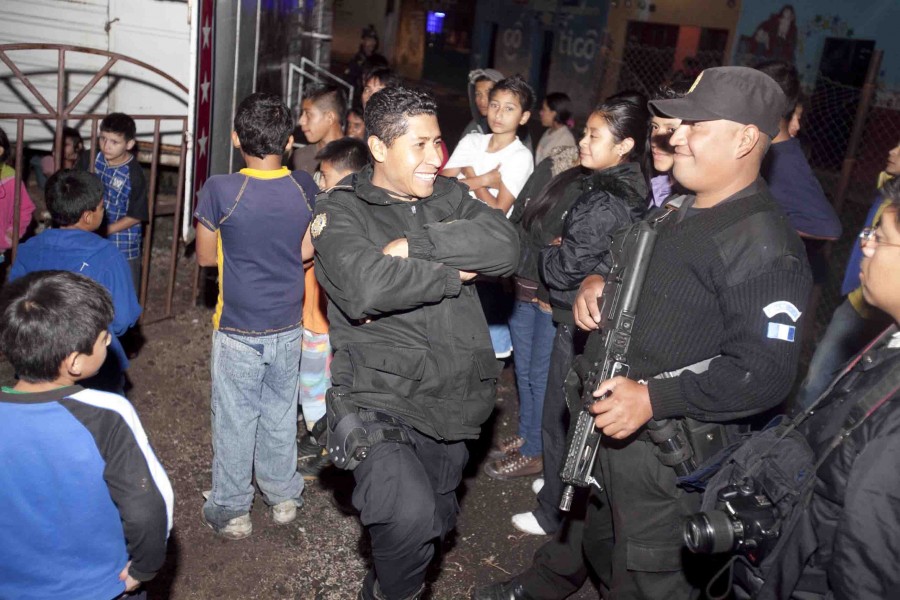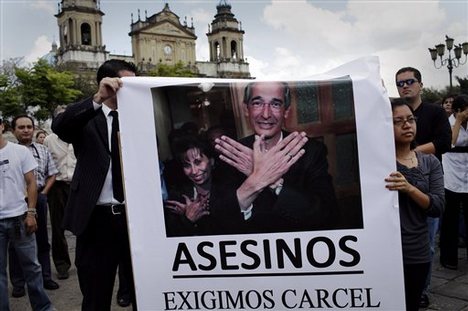Why They Took The Lion
“They are taking the lion to the vet, because he is sick. He is merely sick.”
“We are taking the lion to live in the zoo in Guatemala City because they have kept him in inhumane conditions.”
“They are taking the lion because they have a court order to take the lion.”
“We are taking the lion because they do not have a permit to have the lion.”
“They are taking the lion because they have been looking for the lion for three years. The lion is a stolen lion.”
On June 20, 2011, the lion left as strangely and unexpectedly as he had come.
The lion arrived on a Monday. He came alone. The morning started off as an otherwise nondescript morning. The gate guard in my gated, Guatemalan community made a variation of the same comment he had been making for months. “Luke, I have a raccoon. But this one bites the face, not the legs.”
“Good,” I responded, feigning seriousness. “Lend me this raccoon so that I can kill it.”
The gate guard bellowed a deep chuckle and waved me through. A few months before I had shown the guard the wounds in my legs from a raccoon attack, and since that date, this was the recurring topic of our conversations.
As I drove out of my neighborhood to work that morning, a cage containing a lion was sitting in the center of the vacant lot behind my house in Jocotenango, Guatemala. This was unusual, even for here. Despite living here for three years, strange occurrences and cultural conundrums continue to baffle me. In Guatemala all roads lead down the murky road of mystery.
The afternoon after the morning of the lion’s appearance, an entire circus started setting up and the lion’s presence in the vacant lot soon made sense. He was merely the first arrival of “The Jordan Bro Circus.” A sign outside advertised a dozen marvels that included suicide trapeze artists, a magic midget and a lion-riding monkey. I soon became a loyal audience member.
The beauty of circuses in this part of the world is the real sense of danger accompanying every wondrous act. You feel that people might get killed. It’s not that you want people get killed, but the over-50-year-old equipment and complete lack of regulation cultivates a tingling tension in the audience.
If you have ever wanted to see a monkey ride a lion, the Jordan Bro Circus is where you can. Or, I should say, it was where you used to be able to see it. They took the lion away.
Three Mondays after the circus came, a mob had gathered outside the circus tent. Over 30 police officers and military men were stationed around the circus tent armed with Rambo-sized guns. I had never seen so many police officers in one place and assumed something big must be going down.
“What’s going on?” I asked one of the onlookers.
“They are taking the lion,” she said.
I rushed to my house and told my photographer roommate to grab his gear to capture the moment. My parents, who were visiting me from North Dakota, rushed with us to the scene. I recognized a dozen reporters amongst the onlookers and asked one why they were taking the lion. “They are taking the lion because they have been looking for the lion for three years,” he told me. “The lion is a stolen lion.”
The sad clowns were extra sad that night. They were out of costume, but bits of white makeup still lingered on their faces. I asked one why they were taking they lion. “They are taking the lion to the vet, because he is sick. He is merely sick.”
 As a man walked out of the blocked-off circus tent with a large tranquilizer gun, a policeman motioned for everyone to back up. The man with the dart gun had a private spark of joy on his face. He breathed deeply and seemed to inhabit a world very far from the present one. He looked out at us and seemed saddened that we would never know his joy. And how could we — those of us who had never shot a lion with a massive tranquilizer gun –ever understand the world as he did?
As a man walked out of the blocked-off circus tent with a large tranquilizer gun, a policeman motioned for everyone to back up. The man with the dart gun had a private spark of joy on his face. He breathed deeply and seemed to inhabit a world very far from the present one. He looked out at us and seemed saddened that we would never know his joy. And how could we — those of us who had never shot a lion with a massive tranquilizer gun –ever understand the world as he did?
The circus announcer came out and told the press that they could not take pictures. The press merely pressed forward, unaffected by his insistence. I motioned for my roommate to move forward and our height, which towered over the shorter crowd around us, gave us excellent vantage points.
Everyone tensely anticipated the same thing. The lion is coming!
I asked one of the police officers why they were taking the lion. “We are taking the lion to live in the zoo in Guatemala City, because they have kept him in inhumane conditions.”
A shabby Toyota pickup truck backed up to the entrance of the circus tent.
The lion is coming!
I asked a military man carrying an automatic weapon why they were taking the lion. “We are taking the lion because they do not have a permit to have the lion.”
Then the lion came!
Kids rushed forward and a man from the press climbed atop the cab of the pickup with his camera hoisted high above him as a coffin-sized cage covered in tarps was heaved into the pickup.
Though we couldn’t see it, we all knew that the lion was sleeping inside.
The pickup then sped off and the lion was gone. The police trickled into their vehicles and soon there was only a crowd and the lionless circus. A beautiful woman, who I recognized as the circus’s contortionist, seemed lost as she gazed at the curve in the road where the pickup had disappeared, leaving only a fleeting cloud of dust.
“Why have they taken the lion?” I asked her. But she did not respond. Her empty eyes no longer seemed to understand anything but loss. For the crowd gathered, the lion’s departure was something exciting to gawk at. But for everyone in the traveling circus, it would be remembered as one of the most devastating days of their lives. For them, they had lost a vital part of who their identity. They were no longer the circus with the lion. The were a family who had lost the lion they grew up with.
 I wanted to keep asking my question, “Why did they take the lion?” I needed to know why. I needed to know the truth. But everyone I asked had a different story to tell. Even the police taking the lion couldn’t agree upon the reason they were taking it.
I wanted to keep asking my question, “Why did they take the lion?” I needed to know why. I needed to know the truth. But everyone I asked had a different story to tell. Even the police taking the lion couldn’t agree upon the reason they were taking it.
I knew I would write about this incident, and was trying to act like a journalist who got to the bottom of things. I wanted the truth. My dad, who only had two days left in Guatemala, was eager to get on with our planned activities that evening. “You can end your story any way you want to,” he said, after I had received four incompatible versions of the lion-taking.
I had the right question, but the wrong country. In my 3+ years living in Guatemala, I’ve discovered that the truth is always shrouded — buried just beyond everyone’s reach. Simple questions here lead to mysteries, not answers. Dishonesty rules the day. In the development program I direct, people who are caught stealing lose their job. But there is always doubt, because no one ever admits to the theft, despite overwhelming evidence. They can watch themselves on camera stealing and still stick to their story, “I did not do it.”
A friend whose worked here longer than I says that they learn from an early age to deny everything.
Deny, deny, deny, they are taught.
There are reasons for this.
It’s a country that’s been trained to deny everything to save their skin. So they cling with their lives to lies. Guatemala’s 36-year civil war was as much a 36-year genocide, where the military was responsible for the calculated murders of its own people. People informed on others to avoid being the target of other informants and everyone lived in a perpetual climate of fear.
Fearing for their lives, people learned to tell the authorities what they thought they wanted to hear, regardless of the truth.
Last year, when a prominent Guatemalan attorney, Rodrigo Rosenberg, was shot and killed, a video surfaced on You Tube of Rosenberg. The video contained Rosenberg talking on camera saying, “If you are watching this, it means I have been murdered by President Alvero Colom.” The video went on to implicate the government’s highest ranking authorities as being involved in heavy corruption and being in bed with the Narcotraffickers who really run the country. It almost led to the overthrow of the current government.
 But what seemed was true was not. This case is a rare example where the truth actually came to the surface. Finding the truth serves to highlight just how concealed it is here. The UN’s International Commission against Impunity followed a winding trail of clues to discover that Rosenberg had set up his own murder so as to implicate the president, who he believed was responsible for the death of a murdered woman he had fallen in love with. He knew the legal system enough to know that the evidence he had to implicate the president for her murder would not stand up in court, so he gave his life hoping it would lead to what he believed was justice.
But what seemed was true was not. This case is a rare example where the truth actually came to the surface. Finding the truth serves to highlight just how concealed it is here. The UN’s International Commission against Impunity followed a winding trail of clues to discover that Rosenberg had set up his own murder so as to implicate the president, who he believed was responsible for the death of a murdered woman he had fallen in love with. He knew the legal system enough to know that the evidence he had to implicate the president for her murder would not stand up in court, so he gave his life hoping it would lead to what he believed was justice.
And that’s what happens in Guatemala. People agree on reality and it becomes reality. Corrupt politicians decide reality and it becomes reality. Unfaithful spouses decide reality and it becomes reality. An attorney seeking justice gave his life to coax the world into believing a lie that he thought would deliver justice.
The truth will set you free, says the famous Bible verse. But historically in Guatemala, the truth will get you killed. Whistle blowers get their heads blown off. In a country where for less than $100 you can order a stabbing, it’s best to keep your mouth shut.
“Luke, you can end the story anyway you want it to end it,” my dad said. And so this story ends in doubt. People tell themselves whatever convenient fiction they need to, reality be damned. I want to end this story with the truth, but I can’t. All I can tell you is that for some reason, unknown to me, they took the lion away and that surely somebody, somewhere, really knows why.

About the Author
 Luke Maguire Armstrong lives in Guatemala directing the humanitarian aid organization, Nuestros Ahijados. His book of poetry, iPoems for the Dolphins to Click Home About (available for sale on Amazon.com) is especially enjoyed by people who “don’t read poetry.” (@lukespartacus)
Luke Maguire Armstrong lives in Guatemala directing the humanitarian aid organization, Nuestros Ahijados. His book of poetry, iPoems for the Dolphins to Click Home About (available for sale on Amazon.com) is especially enjoyed by people who “don’t read poetry.” (@lukespartacus)
